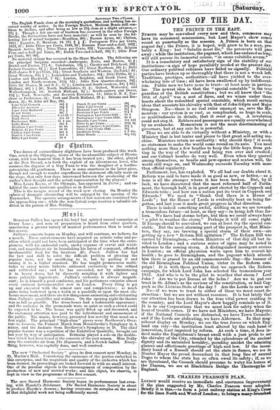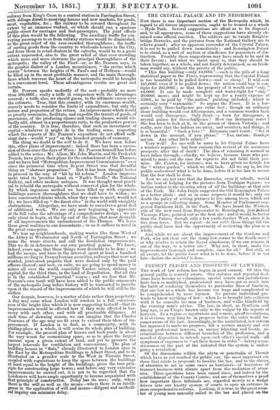MR. CHARLES PEARSON'S. PLAN.
LaNnoN would receive an immediate and enormous improvement if the plan suggested by Mr. Charles Pearson were adopted. Briefly it is this,—to form a joint railway station at King's Crew for the lines North and West of London; to bring-a manrinnnehed railway from King's Cross to a central station in Farringdon Street, with sidings direetto receiving-houses and new markets, for goods, meat, vegetables, 8ro. ; the railway to be covered throughout its extent by an immense viaduct, on which should run a spacious public street for carriages and foot-passengers. The joint effects of this plan would be the following. The auxiliary traffic for con- veying passengers to or from railway stations would be diminished, to the &reat relief of the over-crowded thoroughfares; the traffic of carting goods from the country to wholesale-houses in the City, and from them to retail-dealers in the suburbs, would be to a great extent superseded, also to the great relief of that over-crowding which more and more obstructs the principal thoroughfares of the metropolis ; the valley of the Fleet—or, as Mr. Pearson says, in the graphic dialect of a London mountaineer, " the ravine which yawns' between the heights of St. Paul's and of Holborn—would be filled up in the most profitable manner, and the main thorough- fares which traverse the heart of the metropolis would be brought to a convenient level. These advantageous results are great and certain.
Mr. Pearson speaks modestly of the cost—probably no more than 500,0001. ; really a trifle in comparison with the advantages secured; a trifle also, we should guess, to the ultimate excess over the estimate. Tree, that this country, with its enormous wealth, scarcely needs to consider the limits of expenditure, but only the nature and proportion of the return. An improvement which would so greatly economize, facilitate, and expedite the transit of goods, of provisions, of the producing classes and trading classes, would vir- tually add, almost in a proportionate ratio, to the productive powers of the country. It is true, therefore, that such an investment of capital—whatever it might do in the trading sense, respecting which the reports of Mr. Pearson's exposition do not afford suffi- cient data—would. " pay" on the broadest grounds of economy.
The thing we doubt is the will to do it. We have seen before this, other plans of improvement ; indeed there has been a slimes.. sion of them since the days of Wren : Mr. Pearson himself has before added to the series ; Mr. Allom, Mr. John Martin, and Sir Frederick Trench, have given their plans for the embankment of the Thames ; and we have had "Metropolitan-Improvement Commissioners " ever since the primeval time when Regent Street was that dreadful thing an "abstract proposition." But it has been thought better to proceed in the way of "bit by bit reform." London improve- ment tried its 'prentice hand on " Nash's Needle," the National Gallery, and other modern antiques. It was thought most practi- cal to rebuild the metropolis without concerted plan for the whole. By which ingenious method we have filled up with expensive buildings narrow thoroughfares that we shall have to widen; we have constructed drains which, when they came to meet, would not fit; we have filled up " the finest sites " in the world with unsightly obstructions. Altogether, we have made to ourselves a great deal of additional work. We are only now beginning to appreciate at its full value the advantage of a comprehensive design ; we are only about to begin, at the tip end of the line, that most desirable of all improvements the embankment of the Thames. We leave these great realities to our descendants ; to us it suffices to revel in the great conception. We tear up neighbourhoods, making wastes like those West of the Abbey in Westminster and North of Farringdon Street ; we name the waste streets, and call the desolation improvements. This we do in deference to our own practical genius. We knew, indeed, years ago, that these things were desirable to be done ; we had the means, and have in the interval spent at least a hundred millions sterling in Pennsylvanian securities, railways that were not wanted, joint-stock projects. that were desired only by the paid officers thereof; and now, en suite, we are going to spend money in mines all over the world, especially Yankee mines, sinking our capital, for the third time, in the land of Repudiation. But all this is in the established "practical" course ; and we fear that Mr. Pearson's own tomb will have been added to the public ornaments of the metropolis long before history will be warranted to inscribe upon it the record of the improvements of which he will still be the author.
Our despair, however, is a matter of date rather than perpetuity. A day may come when London will awaken to a full conscious- ness of the bright idea which it is now suggesting to itself—that its improvements would be effected best if they were effected in har- mony with each other, and with all practicable diligence. At such time of dawning reason, we can imagine that the Charles Pearsons of the age may see fit even to extend their ideas of im- provement. If London is to deal, as a community, with its abiding-place as a whole, it will revise its whole plan of building. For example, the present plan of houses and back-yards is about the very worst for economizing space, so as to place the largest amount upon a given, extent of land, and yet to preserve the largest intervals for ventilation and convenience. The plan of building houses in. "fiats," already illustrated to London eyes in the East by the Metropolitan Buildings in Albert Street, and to be illustrated on a. grander scale to the West in Victoria Street, coupled with regulations to keep the space between the buildings at least equal to the height of the buildings, gives the true prin- ciple for constructing large towns ; and before any very extensive improvements be carried out, it is not to be regretted that the Londoners will have ample opportunity to become acquainted with that principle of construction. Belay has its uses; only, where there is the will as well as the means—where there is an intelli- gence in the application of will and means—diligeet and methodic cal inquiry can minimize delay..



























 Previous page
Previous page